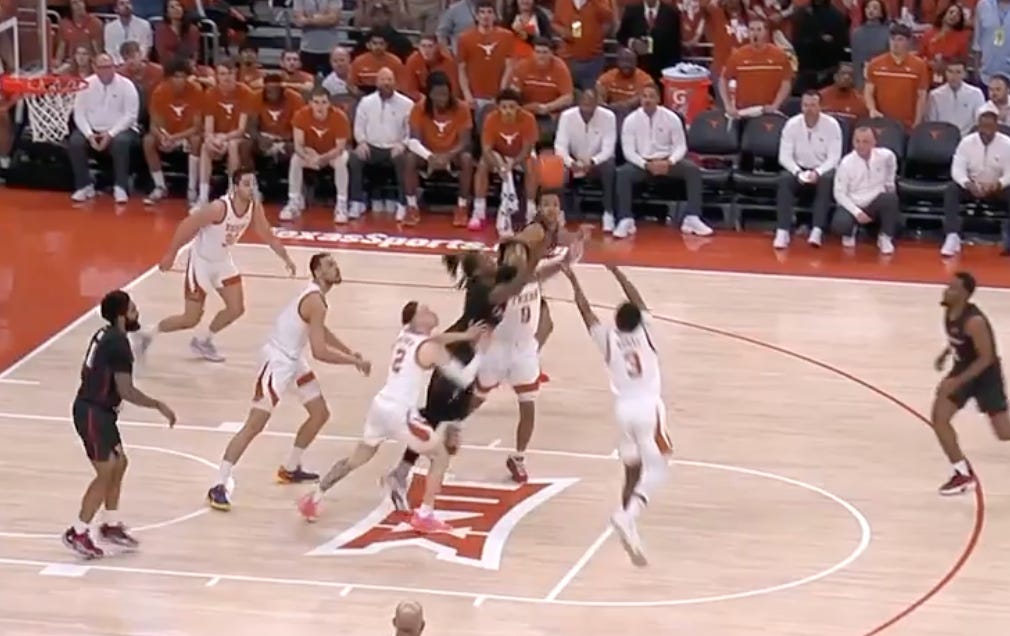The ascendence of Houston basketball has been nothing short of remarkable. When Kelvin Sampson was hired prior to the 2015 season, the Cougars had made one tournament appearance in this millennium, a one-game dismissal as a 13-seed in 2010. That stretch included many seasons of complete irrelevance. One might call it the Zero Kelvin era. (At zero kelvin, all molecular motion stops, much like Tom Penders’ offenses of the late aughts.)
It took Lord Kelvin four seasons to get to the tournament and this season will make the program’s seventh appearance in a row, and all of them have been bubble-free. Houston has had 12 wins in the five tournaments that actually occurred. The only comparable program resurrection in modern times is the Scott Drew era at Baylor.
Much like Drew, Sampson’s teams have been excellent offensive rebounders. The last four seasons they’ve finished 2nd, 2nd, 3rd, and 4th nationally in offensive rebound percentage. The Cougars are sixth this year, although the remainder of Big 12 play is probably going knock that down a few pegs. Still, year-in and year-out this is one of the best offensive rebounding teams in the country.
There is a large segment of college basketball fans who do not share my enthusiasm for Houston basketball. People say they like to root for the underdog, but when push comes to shove, they’ll root for the team that gets the five-star players and the best transfers. Houston doesn’t really get any of that.
Heading into the season, the closest thing to a sure-fire NBA draft pick on the roster was Terrance Arceneaux and he tore his Achilles in December. There are just six Cougars from Sampson’s tournament teams currently playing in the NBA. Just three were drafted. Those players have combined for just three 20-point games this season. And all of those were by Marcus Sasser for a 6-40 team.
Sampson’s Cougars always have talent but it’s rarely high-end talent. They make up the gap with activity. And how can you not root for that? (Well, many people find ways.) Analysts have struggled to measure activity but a signature of Houston’s offensive rebounding is that it’s driven by their ability to rebound long misses. Many of these cases are going to be balls that end up on the floor when leaping ability and size are no longer important to obtaining possession. Effort becomes a bigger factor.
Per play-by-play data, over the past 3 seasons, the Cougars have rebounded 40.1% of their three-point misses, which is the second-best rate in the country (Congrats, Purdue). They’ve rebounded 38.7% of their long 2’s, which is also 2nd in the country (Congrats, Towson). On shots near the rim, they’ve been quite fine, just not exceptional, grabbing 42.9% of their misses and ranking 28th over that time. It’s the long rebounds that drive their success.
This season, the difference is even more dramatic. They’ve rebounded 40.7% of their missed 3’s (5th), 42.5% of their long 2’s (4th) and just 38.9% of their short 2’s (164th). They’ve actually been a below-average offensive rebounding team on shots at the rim! But on shots where rebounds are likely to be longer or get to the floor, they excel.1
The thing about Houston’s offensive rebounding is that it’s more necessary than most teams. The Cougars have never been a great shooting team, but this season they’re a lousy 208th in effective field goal percentage. The Houston-haters mostly refer to their weak non-conference schedule as evidence that the team is destined for doom. But a more intelligent argument about Houston’s future would start with its shooting. There isn’t much of a precedent in modern times for such a poor shooting team winning a title. (2011 UConn finished 213th, so there’s that.)
On top of that, while Houston’s defense has been dominant on most nights, it’s more difficult than ever for defenses to be successful as the season concludes. As of Tuesday, the computer estimated the current D-I average for offensive rating at 106.0, which would be the highest season-ending value in history. It will actually go a little higher before we get to the tournament. (Although once the tournament starts and teams start playing with a possibly-defective ball, it may drop a little.)
And nobody has won a title with a profile as unbalanced defensively as Houston’s. Offense doesn’t win championships, but a great offense is almost a prerequisite to winning a title since we’ve been measuring this stuff. All of that doesn’t bode well. Hustle on its own only takes you so far, especially against the best teams in March.
Still, the Houston offense does rank 17th, which is saying something given how poorly they shoot. But the shooting (and don’t get me wrong, many other non-sensical things) feed the perception that Houston is an underdog even though they haven’t actually been an underdog in any single game this season.
The shooting will have to improve for Houston to reach its postseason goals, but the Cougars don’t have to shoot lights out to have an elite offense. As long as they continue to win 50/50 balls (which are closer to 30/70 balls for the average team) more than any other team, their shooting percentage won’t tell the whole story about how effective their offense is when a shot goes up.
Houston is a pretty underwhelming defensive rebounding team, but even on that end we see the hustle. Over the last three seasons they rank 29th in the country in defensive rebound rate on 3-point misses. Their strength is in scramble situations on both ends.




